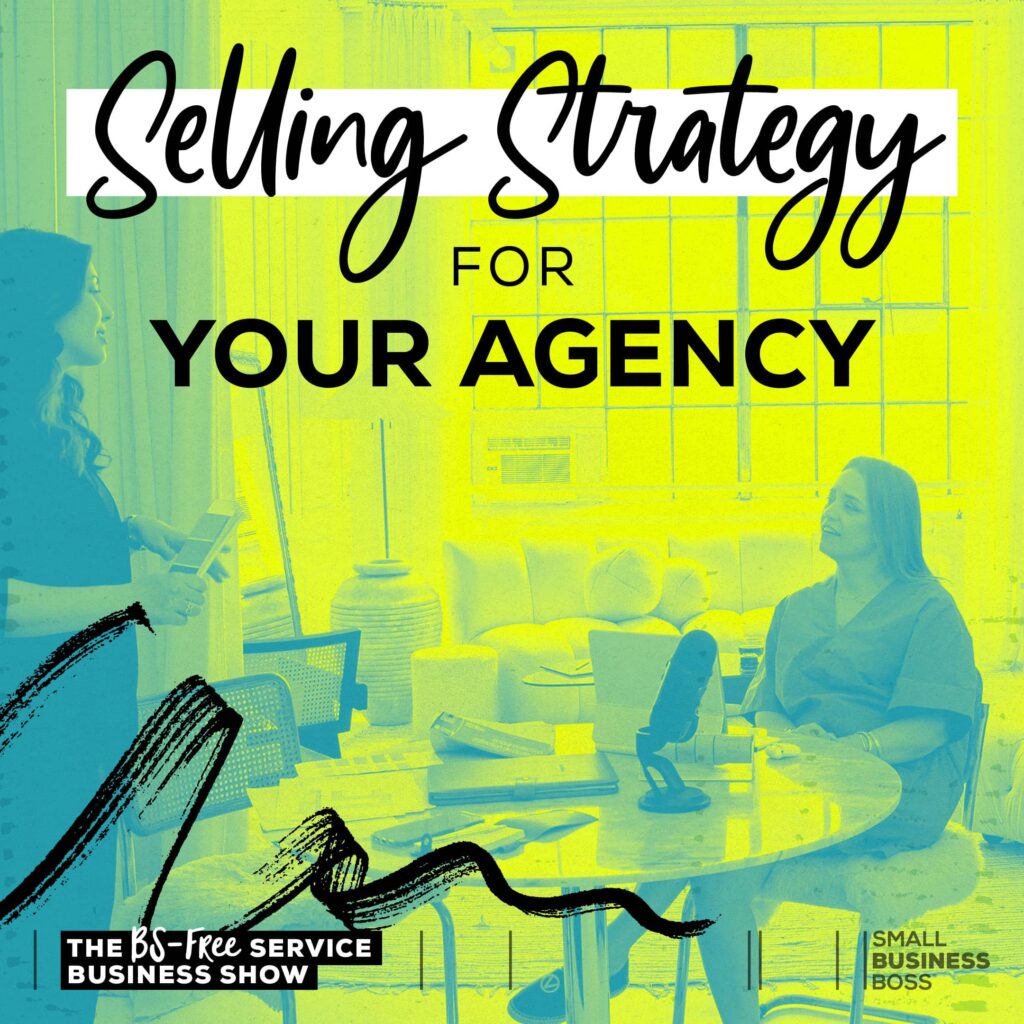
Selling Strategy for Your Agency
Are you selling strategy right now in your agency? Do you feel like a thought leader or like you’re totally unappreciated by your clients?
In this episode, we’re looking at the power of strategy packages for your agency. And the hidden ripple effect selling strategy will have on everything from your revenue to your reputation.
As an agency owner, it’s easy to get so focused on doing work for your clients and running the business. You’re juggling so many different things on a day-to-day basis that something has to give.
Speaking from experience here, the thing that tends to suffer is your thought leadership. If your agency is booked out, you may not think that’s a big deal, but let me tell you when your thought leadership as the agency owner is neglected there’s a ripple impact.
Your Lack of Thought Leadership Impacts Your Revenue
When your thought leadership is shaky (or simply non-existent), it impacts your bottom line.
But before we go any further, let’s define exactly what I mean by thought leadership. I particularly like the Thought Leader Lab’s definition, “Thought leaders are the informed opinion leaders and the go-to people in their field of expertise.”
As an agency owner, you absolutely need to be a go-to person in your field. Your potential clients want to hire an expert, and for them to trust you, they need to feel confident in your leadership and expertise.
Your thought leadership directly impacts your ability to find and land clients. It can show up in various ways, but you may not have the volume or quality of potential clients you want. Or you may find that you simply can’t get clients to pay your desired prices.
Those are the most obvious ways, but there are a few other sneaky ways that not being seen as an expert can impact your revenue.
Something I’ve personally experienced is lost revenue opportunities with existing clients. In my situation, I’d be the trusted, reliable copywriter on retainer but they’d hire a fancy copywriter to write their sales pages. That was revenue that was mine to lose, and while I didn’t expect them to hire me for everything, it would have been nice to be considered.
The difference between me and the fancy copywriter was thought leadership. They weren’t more experienced or skilled than I was, but they had something I didn’t. They had clout.
Related to this is another revenue leak. It’s less obvious but when you’re overlooked in this way, it impacts how you feel about the work you do. You may doubt yourself. You may be resentful. And that bleeds into other things and affects your revenue in small, sneaky ways.
For example, if you’re feeling shaky because a client didn’t hire you or overlooked you, it can mess with your head. You may find yourself over delivering to prove something, which costs you time and money. Or you may find yourself pissed off and under delivering so you end up losing a client or impacting your client relationships.
These are subtle, but how you feel about the work your agency does day in, and day out, and your client relationships have more of an impact than we realize.
The final piece of this puzzle is that your thought leadership and position in the market have everything to do with your ability to sell strategy.
Why is Selling Strategy so Important?
Being able to Sell the Strategy can make or break your agency’s revenue.
Too many agency owners are undervaluing the strategic thinking they bring to their clients. They don’t charge for strategy work and end up burying it in their day-to-day execution of client projects.
Why does this happen? First, it ties back to the thought leadership issue. If you don’t position yourself as a thought leader, you probably don’t feel like one, and you’re less likely to charge for strategy.
The other reason is the curse of the expert, also known as the curse of knowledge. According to DecisionLab, this is a “cognitive bias where we incorrectly assume that everyone knows as much as we do on a given topic”.
This can make it hard to teach or explain a topic, but it also can result in us assuming other people know what we know.
Camerer, Loewenstein, and Weber studied the impact of the curse of knowledge on economics with a fascinating result. When there’s an informational imbalance, we tend to assume that the other person knows what we do. Their study found that because of that instead of exploiting that we have more knowledge, we’re fairer as we think the other party knows what we do.
In the context of your business, if you’re an expert, you can easily fall into the trap of assuming people know what you know and devaluing it. While I’m not advocating for you to defraud your clients, you can easily see how you’re not always valuing your skills and experiences correctly.
I know I’ve had this experience time and time again as a writer. I mean, most people can write and it comes easily to me. If I go into a conversation with a new client assuming they’re as good a writer as I am, I’m likely to lowball my pricing, and I’m probably not going to charge them for strategy.
Whereas if I feel confident in my expertise (thanks to my position as a thought leader), I’m more likely to recognize that a potential client needs my strategic thinking and charge accordingly.
This brings me to the chicken and egg of being able to Sell the Strategy, especially for agency owners.
Selling Strategy Forces You to Position Yourself
You’re probably thinking right now about how you’d love to get paid (or paid more) for the strategy work you do for clients. But you’re also thinking about how your thought leadership isn’t strong enough to pull it off.
First, if you’re running a business, especially an agency, and clients are hiring you today, you have thought leadership. You need to build on that to get to the point where you can sell strategy effectively.
And the easiest way to do that is to nail down your strategy offers so you can position yourself as an expert on that topic. Having a strategy that is the entry point for the work you do with clients forces you to get specific and put a stake in the ground about what you want to be known for.
As an example, let’s say you run a consulting agency where you work with law firms on their customer relationship management (CRM) implementation. As a team, you likely offer a number of services, but the number one thing every single firm that comes to your need is an analysis and audit of their CRM so you can map out a strategy for your work together.
Maybe you do this to some degree, but it’s not a fully built-out package, or you’re not calling it a strategy project and burying it in other work so it’s not viewed by your potential clients as a non-negotiable.
To sell your audit and analysis strategy package, you need people to not just trust you, but know that you’re the go-to expert on CRM strategy for law firms. Using the strategy offer you’ve created, you then can position yourself accordingly by speaking at legal conferences, writing for their publications and dominating Google for specific terms with your blog posts.
Without a clearly defined strategy offer, you’re likely struggling to figure out how to position yourself as you have too many options. You literally could talk about 10 different topics and you’re not sure what marketing to actually do.
This right here is why agency owners, and honestly, any service business owner, should be figuring out how to Sell the Strategy. It ensures that you get paid for the strategic work you’re already doing, while building your expertise, nailing down your marketing plan, and ultimately finding new clients.
Not selling strategy is a major missed opportunity for agency owners, and I want to see that change. In the 2023 Agency Mastermind, I’ve added an exclusive Sell the Strategy workshop for members that I’m super excited about.
And honestly, whether you work with me on your strategy package or not, do not let this opportunity slide by. Get your strategy package ready to go, and then start building your thought leadership on it. A year from now you’ll be so grateful you did.



